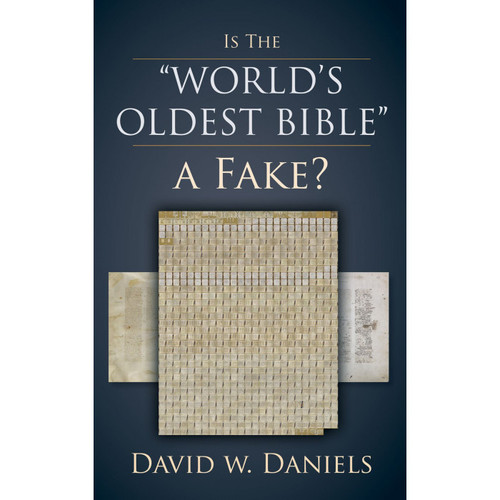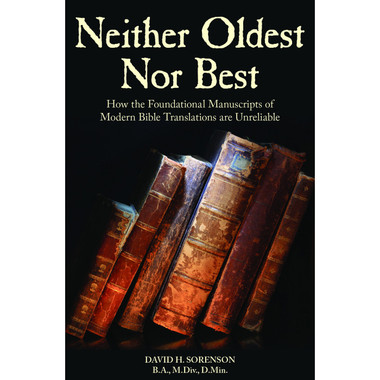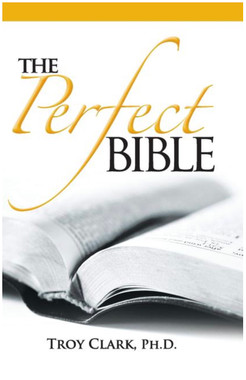Description
Author: David W. Daniels
Modern research techniques have revealed a hidden scheme aimed at God's Holy Words...
Modern Bibles have changed many verses because of the discovery of an "ancient" manuscript in a monastery on the Sinai Peninsula.
The manuscript, called Sinaiticus, is claimed to be the earliest complete copy of the New Testament. Its discoverer, who was a world leading Bible scholar in his time, told the world Sinaiticus was from the 4th century and that it was the "oldest and best" Bible available.
Sample Pages
Publishers rushed to make new Bibles with many changes to match it.
But not everyone agreed. When this famed 19th century Bible scholar, Constantine Von Tischendorf, claimed the ancient date, a well-known Greek calligrapher said, "No! I made that document!" But why did no one believe him? Maybe it's because pages of the manuscript were stored where no one could view them, archived in exclusive collections across several continents.
Now, an international group has carefully photographed each page of Sinaiticus and is displaying it on the internet as high-quality digital images. For the first time, Bible scholars and students can see the entire manuscript together, as was never possible before. And what they are seeing with their own eyes is shocking. Some of the pages are white and look quite new, while others have been darkened to make them look very old. If they are all from the same "old" Bible, how can this be?
Researcher David W. Daniels proves with easy-to-understand evidence that the Sinaiticus is not the oldest manuscript and certainly not the best, either. He is also convincing in showing it's not old after all and that the Greek calligrapher did make it, in the 19th century.
The textual (and doctrinal) changes in modern Bibles are based upon a fake —a shadowy scheme worthy of Satan's hatred for the preserved words of God.
Table of Contents:
Chapter 1: Read This First
Did God keep His promise to preserve His word or was it hidden for centuries in obscure books, only to be revealed in the last couple of centuries? Modern research techniques reveal that at least one of these books is a fake.
Chapter 2: Satan's Plan B
Beginning with Eve, Satan's plan was to raise doubt in God's words. In the church age, he has used every tool, from bonfires to inquisitions to stamp them out. When that didn't work, he resorted to his old technique of casting doubt, by "fixing" the Bible with a classic bait-and-switch strategy.
Chapter 3: A Case in Point: Why Should We Preach Mark 16?
What happened when Deborah and I visited a church to hear our Greek professor deliver an Easter message from Mark 16. This is a classic example of how modern scholarship has promoted doubt instead of faith in the words of God.
SECTION I: THE BIG PICTURE
Chapter 4: Separating Fact from Fiction
How I became suspicious that something might be wrong with the Sinaiticus. How I went from viewing it as just a messed up old manuscript that had affected all the modern versions, to realizing that it might, indeed, be some kind of a fake.
Chapter 5: Telling Bibles Apart: Good Stream vs. Bad Stream
Simplified explanation of the two historical streams of manuscripts. How one stream preserved a trustworthy English Bible and the other produces polluted Bibles modified to fit into a one world religion.
Chapter 6: Why the NWO Hates the KJV
This details how the New World Order proponents, specifically Manly P. Hall, planned to condition the world population to accept one world government and religion: the Bible must be "fixed" and the KJV must be eliminated!
Chapter 7: KJV, Sinaiticus and the NWO
Manly P. Hall touted the importance of the Sinaiticus, to change the Bible to fit into the one world religion and to loosen people's grip on the KJV.
SECTION II: SINAITICUS: NOT WHAT WE WERE TOLD
Chapter 8: Why You Can't Trust Sinaiticus
The beginning of the evidence. Look at these defects in the Sinaiticus; especially the missing verses between 1 Chronicles and Ezra.
Chapter 9: Is Sinaiticus a Fake?
Learn about the color differences between the CFA and other Sinaiticus pages. And look at how some of its missing verses affect doctrines, such as in 1 John 5:7 and Mark 16:9-20.
Chapter 10: Is the Sinaiticus Origin a Lie?
I found historians who raised excellent questions about Tischendorf 's story of how he found Sinaiticus. And see how it changes scriptures, such as Matthew 5:22 and John 7:8, affecting modern Bible texts.
Chapter 11: Coloring the Truth
Reexamines some of Tischendorf 's narrative and tries to discover the source of the strange color differences of the pages.
Chapter 12: Who Darkened Sinaiticus?
More detailed examination of the history of the various sections of the Sinaiticus, leading to who could have darkened its pages.
Chapter 13: Which Part is Scripture?
Casts serious suspicion on Tischendorf 's truthfulness and motives. Describes how impossible it is to sort through all the corrections, additions, missing sections to really know what God said.
Chapter 14: Deleted on Purpose?
Describes the difficulty for those who trust Sinaiticus, to determine exactly whether Mark 16:9-20 belonged in the Bible.
Chapter 15: Is that Your Best Job?
Reasons why the Sinaiticus cannot be one of the 50 bibles commissioned by Constantine, to be supplied by Eusebius. Describes how Constantine's request for quality Bibles could not have been met by the mess that is the Sinaiticus.
Chapter 16: Uniquely Bad
Describes the rough draft quality of the Sinaiticus and postulates that it might have been a rush job, increasing the suspicion that it was faked.
Chapter 17: How Old Is It Really?
Detailed reasons why the early date of the Sinaiticus is probably wrong. We know it's not the best, but it's not the oldest, either.
Chapter 18: What Did Constantine Want?
More details of why the Sinaiticus and Vaticanus cannot be two of the Bibles that Constantine ordered from Eusebius.
Chapter 19: Sinaiticus and the Zombie Apocalypse
A run-down of the "scholars" and "professors" involved in validating the Sinaiticus. Includes prominent figures in the history of the Sinaiticus as well as in my own academic journey.
Chapter 20: It's A Job
Describes the huge academic and commercial effort behind the modern Bibles. Many are just in it for a career. Others, who are really dedicated to the task of providing translations, are locked into a system dominated and defined by Rome.
Chapter 21: No Doctrine Affected?
Refutes the claim that no doctrines are affected by changes based on the Sinaiticus and Vaticanus. Discusses Mark 16:9-20 and other scriptures that are left out or altered, then used by scholars to cast doubt on Christ's resurrection and ascension.
Chapter 22: Prove It!
Uses the story of Codex 2427 as an example of how a supposedly high-value manuscript was proven a fake by elaborate academic detective work. Then it shows how the same process has not been applied to the Sinaiticus to test whether it is a fraud.
Chapter 23: I Trusted Them!
My personal journey from trusting my professors, to frustration over being unable to actually view the Sinaiticus, to finally seeing it, thanks to modern technology, to my conclusion that it is a fraud, and to my trust in the KJV.
Chapter 24: Three Big Mistakes of Text Critics
Shows how text critics ignore simple common sense, the influence of Satan, and God's power to preserve His word.
SECTION III: APOCRYPHA
Chapter 25: What's in YOUR Bible?
Modern research and archeology continue to uncover the accuracy of scripture. However, this same careful research exposes the Apocrypha as simply fanciful fiction.
Chapter 26: What's Wrong with Tobit?
The Apocrypha book, Tobit, is a good example of how so many of the Apocrypha books are simply folk tales. When modern research is applied, they are more fiction than fact. However, all Roman Catholic Bibles contain Apocryphal books, because they are necessary to support some of Rome's heathen doctrines.
SECTION IV: THE BIBLE VERSION CONSPIRACY
Chapter 27: The Evidence
Overview of 20 facts discovered in the research into the origin and importance of the Sinaiticus.
Chapter 28: The Beginning to the 1800s
Review of the history of Bible manuscripts, from the beginning until the 1800s, leading up to the discovery of the Sinaiticus.
Chapter 29: 1800s to Today
The appearance of the Sinaiticus and the Vaticanus and their effect on modern Bible versions.
Chapter 30: The Sinaiticus Smoking Gun?
Explanation of Simonides' claim that he was the originator of the Sinaiticus manuscript and some facts that just may prove to be a missing piece to the puzzle.
Chapter 31: Conclusion
The effort to "fix" the Classic English Bible led to the substitution of fake manuscripts to support the text. All the modern Bibles are influenced in some way by this bait-and-switch. On top of the resulting confusion is a plot to discredit the only Bible that was made through faithful translation of correct texts. Satan is well pleased by the wide-spread doubt in God's words.
Appendix A: Comparison Chart of Books Containing the Apocrypha
Appendix B: Spurgeon's Quote







